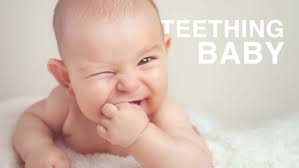
I’ve always been intrigued by the intense interest parents have in teething during their children’s early years and, on the flip side, how quickly the intensity and interest fades after about age three.
The emergence of teeth in
the baby and toddler years has been surrounded by fascination, obsession and superstition
for centuries, maybe even as far back as our very beginnings.
This has led to a lot of myths – some harmless, some misleading, some dangerous
- about the growing of teeth that persist today.
Of course, common beliefs about teething are not viewed as myths by large numbers of parents, health professionals and extended family members. I am aware that my ideas, based on years of observing babies and toddlers are not popular, which I totally get, however, until babies and toddlers can express themselves and tell us what is troubling them none of us know for sure if this age group is affected by teeth coming through, or if teething is the fall-back used to explain behaviours and illnesses that we don’t understand.
It’s impossible to do research that might give us conclusive results as we can’t ask babies and toddlers about their thoughts on the matter. On the other hand we can ask parents, and questionnaires tell us that many, if not most parents view teething as a cause of all manner of things from diarrhoea to ear infections to fevers to red cheeks to sleepless nights.
And I agree that if it’s
your baby and red cheeks, runny poo and sleepless nights coincide with a tooth
appearing it’s reasonable, even reassuring, to assume that the emerging tooth
is the problem. The expectation (hope) is that once the tooth appears the
problem will go away.
I found in my clinical practice, however, that more often than not this wasn’t
the case and diagnosing ‘teething’ wasn’t helpful. Often the tooth never
arrived or if it did nothing changed in regard to the baby’s health or
behaviour.
Eventually, I decided that as a responsible health professional, I could not keep telling parents (or going along with the idea) that a whole range of problems were due to teeth when it was obvious that there were other more rational reasons for worrying baby/toddler health and behaviour.
I realised that ‘it’s teething’ was a quick way for health professionals to end consultations as explaining more rational alternatives is not only time consuming – difficult in a busy practice – but requires patience and tact to get relevant information across without offending worried parents. Alternative ideas/diagnosis’s also require health professionals to have an in-depth knowledge of the normal range of baby and toddler development, particularly sleep.
My main message is to keep an open mind to avoid the pitfalls of the over-use of ‘teething’ medication, the mismanagement of normal but tricky behaviour (particularly sleep), and the possibility of missing a medical problem, which occasionally maybe serious. The growing of teeth is a normal event not a medical problem and only becomes one when decay is present or, for example, when wisdom teeth become impacted.
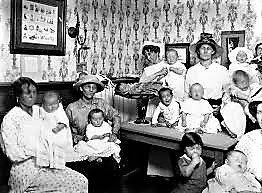
Baby scales are magnets. I once spent a day on a Health Department stall at a Parents and Baby show with the chair scales from my centre sitting in front of the stall. A queue quickly formed and grew by the hour. Parents – mostly mothers – waited patiently to have their babies/toddlers weighed. My contact with the mothers was fleeting, the weighing largely symbolic and not particularly useful, nevertheless, I was intrigued by this display of the compulsive need parents have to weigh their babies.
A big part of the weighing attraction is, of course, the chance for mothers to have a chat, be reassured and perhaps get a niggle or worry off their chests. I was well aware that the ‘pop into the clinic for a quick weigh’ visit often turned into something more; even to serious issues such as postnatal depression or domestic violence.
During the coronavirus lockdown I caught a couple of interviews with new mothers who were finding it difficult at home alone without any hands-on support from their extended families. In one interview I watched a mother valiantly try to weigh her baby on some wobbly scales on a kitchen bench. I wondered if the findings would give her reassurance or alarm.

A radiant smile with healthy, clean teeth is a great fashion accessory whether the teeth are a year old or a hundred years old. These days, children’s teeth have the potential to last from nine months to ninety-nine years but despite a high standard of living and brilliant dental technology compared to the past, decay rates in kids are increasing. Currently in Australia 40% of children develop avoidable dental caries before their sixth birthdays. Up to 8% of these children have serious tooth decay that requires treatment under general anaesthesia.
While there are rare genetic conditions, medications and some illnesses that decrease resistance to decay most children should have strong and healthy gums and teeth throughout their lives.
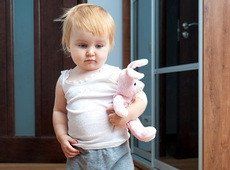
Recently, I heard an interesting snippet about much-loved not quite two-year-old from a good home. She is bright-eyed and bushy-tailed, energetic and engagingly normal. She goes to childcare two days a week where she is looked after by ‘educators’, the name now given to childcare workers.
I do not wish to disparage childcare workers. Historically, they have been – like mothers – underpaid and undervalued. I understand that renaming childcare workers educators is an attempt to give them and the work they do more value and status, which is linked into better pay rates, a career path and the recognition that they are doing more than mere ‘baby-sitting’.
Nevertheless, using the term ‘educators’, as well-meaning as it is intended to be, strongly implies that very young children and babies need formal educational intervention to fulfil their potential and give them a head start. This in turn feeds into the idea that childcare for this age group has advantages not available to children who remain at home in the early years. It also puts pressure on the under-threes (and their parents) that they need to attain similar formal educational aims and objectives that are expected from children in primary and high school.
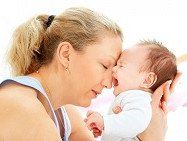
Throughout pregnancy, women are inevitably regaled with stories, not only about the birth, but also about the joys and disasters of breastfeeding.
Confusingly, the enthusiastic
encouragement and the ‘how-to-go-about-it’ advice offered by health
professionals and breastfeeding supporters via classes, books, pamphlets and
videos is often at odds with contrary reports from other mothers - how hard it
is; how easy it is; how anyone can do it if they really want to; how some women
can’t; how bad/good formula is; how, in the end, does it really matter?
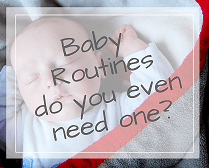
Routines are important for most families. In general, our lives seem to work better when we have a structure to operate in especially when there are a lot of things to fit into each day.
Ideas vary as to what constitutes a routine. Laid-back routines might be viewed as chaos by those who prefer more order. More order might be viewed as unbearably restrictive by the laid-back. Regardless of how routines are perceived and practised, by the time babies appear most people are accustomed to living predictable lives with a fair idea of what is going to happen from one day to the next and - perhaps more importantly - from one night to the next.
Learning to tolerate the daily uncertainty that babies bring
is often difficult for new parents and it is understandable that ‘getting the
baby into a routine’ might be a top priority. While there’s nothing wrong with wanting
predictability, mothers often have unrealistic expectations of themselves and
their babies and how quickly reliable routines can be achieved.
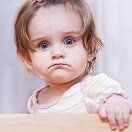
There are many normal developmental, emotional and physical reasons why babies and toddlers have disrupted sleep ( See: Why Don't Babies and Toddlers Sleep the Way We'd Like Them to Sleep? ).
By six months 60-70% of babies are ‘sleeping through the night’. Sleep patterns, however, can – and do - change at the drop of a hat, sometimes for obvious reasons but more often than not for reasons that appear to defy rationality.
The normal individual range of babies’ sleeping and waking
patterns varies considerably and often bears no relation to what and how babies
are fed, teething or babies being too hot or cold, lonely, over-stimulated or any
of the other plethora of reasons hopefully offered up to parents.
If the routine sleep hassles experienced by parents reliably
responded to these ‘solutions’, sleep problems would be non-existent. Baby
advisors would not spend hours each working day talking about ‘sleep’. Waiting
times at parent and baby centres would disappear.

Sleeping mostly relates to baby behaviour and not to the more tangible things parents are likely to hear about when their babies have erratic sleep patterns, for example; hunger, too hot, too cold, wet/pooey nappy, lonely, teething, bored, over-stimulated, a little pain, faulty ‘settling techniques’, too much foremilk, wrong formula…
Of course, there are times when unsettled babies do respond
positively to one of the above proposed remedies and - depending on the
circumstances - they are all worth a try, however often any positive changes
are short-lived and the topsy-turvy sleep habits carry on.
So, my intention here is to focus on less concrete reasons for erratic sleep, reasons that have more to do with normal development and behaviour than the simple solutions relating to those mentioned in the first paragraph.
NB: The term ‘behaviour’ is not used as a way to describe
babies as being ‘good’, ‘naughty’, ‘manipulative’, ‘clever’, ‘spoilt’ or any of
the other labels based on adult concepts, which are meaningless when referring
to humans at an age when they have not yet developed any control over their
behaviour.
Behaviour in this context relates to what babies ‘do’ as
opposed to attempting to diagnose a condition they might have (for example, ‘wind’,
discomfort from a wet/pooey nappy, hunger). Diagnosing a condition implies that
there is a solution. As many mothers become aware, this may not necessarily be the
case.
A wide range of sleep behaviour (and all sorts of other
behaviours) is observable, normal and common to most babies, which is what much
of the advice given to mothers is based on, but it is vital to understand that:
- Babies are unpredictable.
- Frequently, clearly defined reasons to explain why many babies do what they do, especially in relation to sleep, don’t exist, so there are no guaranteed solutions to sleep problems in the first three years, particularly in the first six months.
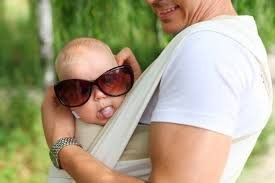
What is attachment?
Most simply stated attachment is an enduring emotional bond between two
people. In this case a baby/child and parents.
What is attachment
theory?
Attachment theory, originally formulated by psychiatrist John Bowlby, in the
1940s/ 1950s attempts to explain how the predictable presence of responsive,
loving attachment figures during infancy is crucial for lifelong mental health.
Bowlby and others hypothesised that a break in the
continuity of the mother-child relationship at a critical stage in the
development of the child’s social responses may result in a permanent
impairment of the ability to make relationships.
Bowlby was surprised, however, to discover that children
proved far more resilient than he suspected.
In a well-known study by Bowlby,
Ainsworth, Boston and Rosenbluth (1)
involving children separated from their mothers for long periods it was found
that those children’s development and behaviour was only marginally different
to a cohort of children who did not experience separation.
Naturally where there are serious ante-natal and or genetic
complications, parental alcohol/drug abuse, instability, serious mental health
problems and extensive neglect children are at risk of significant, perhaps,
lifelong problems, however, studies show that even when this is the case a good
number will overcome their adversity (2,3)
.
Nothing is cast in concrete (4)
.
The main purpose of Bowlby’s work was to urge governments
and people to look again at institutions, non-parental care of neglected or
orphaned children and the common practices in maternity and children’s
hospitals at the time.
It is largely thanks to Bowlby that maternity and children’s hospitals changed to the open and humane places they are today.
Bowlby had very little to say about much-loved babies in
good homes. His research doesn’t show us that certain practices, for example,
baby-wearing, bed-sharing, instant birth bonding, breastfeeding are crucial to
forming a secure attachment.
Unfortunately, Bowlby’s theory and findings, established largely from observation of extreme cases (5,6) , have been applied over-enthusiastically to normal life in normal homes with normal babies.

One of the enduring memories of my childhood is of my sister and me nestled in on either side of my grandmother as she played her piano and sang 'The Little Boy That Santa Claus Forgot'. Upset by Santa’s thoughtlessness and the little boy’s plight, we’d collapse into tiny heaps of trembling lips and overflowing eyes even as we begged her to please, please play it again.
He's the little boy that Santa Claus forgot,
And goodness knows, he didn't want a lot.
He sent a note to Santa
For some soldiers and a drum,
It broke his little heart
When he found Santa hadn't come.
In the street he envies all those lucky boys,
Then wanders home to last year's broken toys.
I'm so sorry for that laddie,
He hasn't got a daddy,
The little boy that Santa Claus forgot.
Tommie Connor / Michael Carr / Jimmy Leach

Robin Barker: Baby Love, The Mighty Toddler, Close To Home